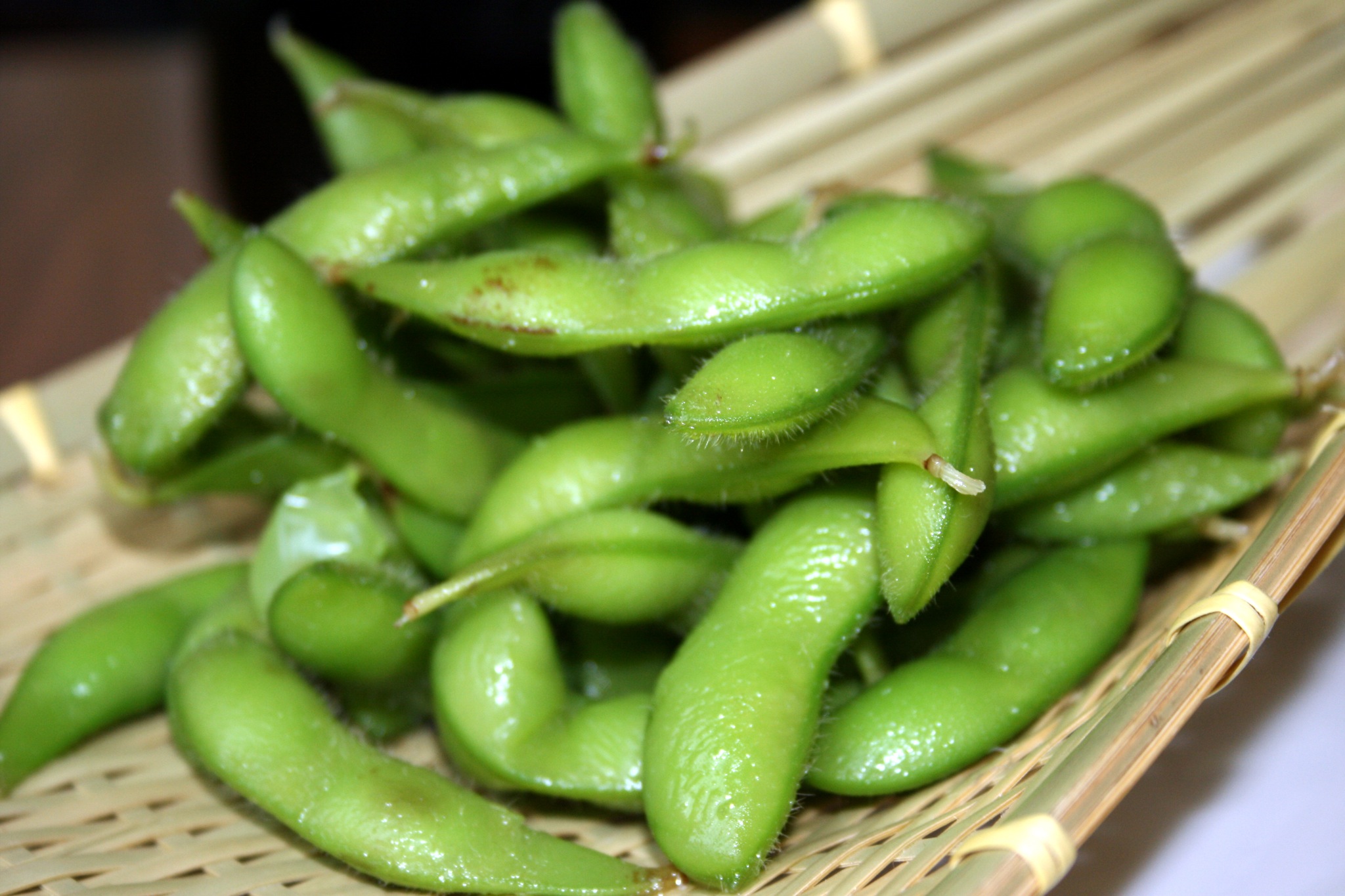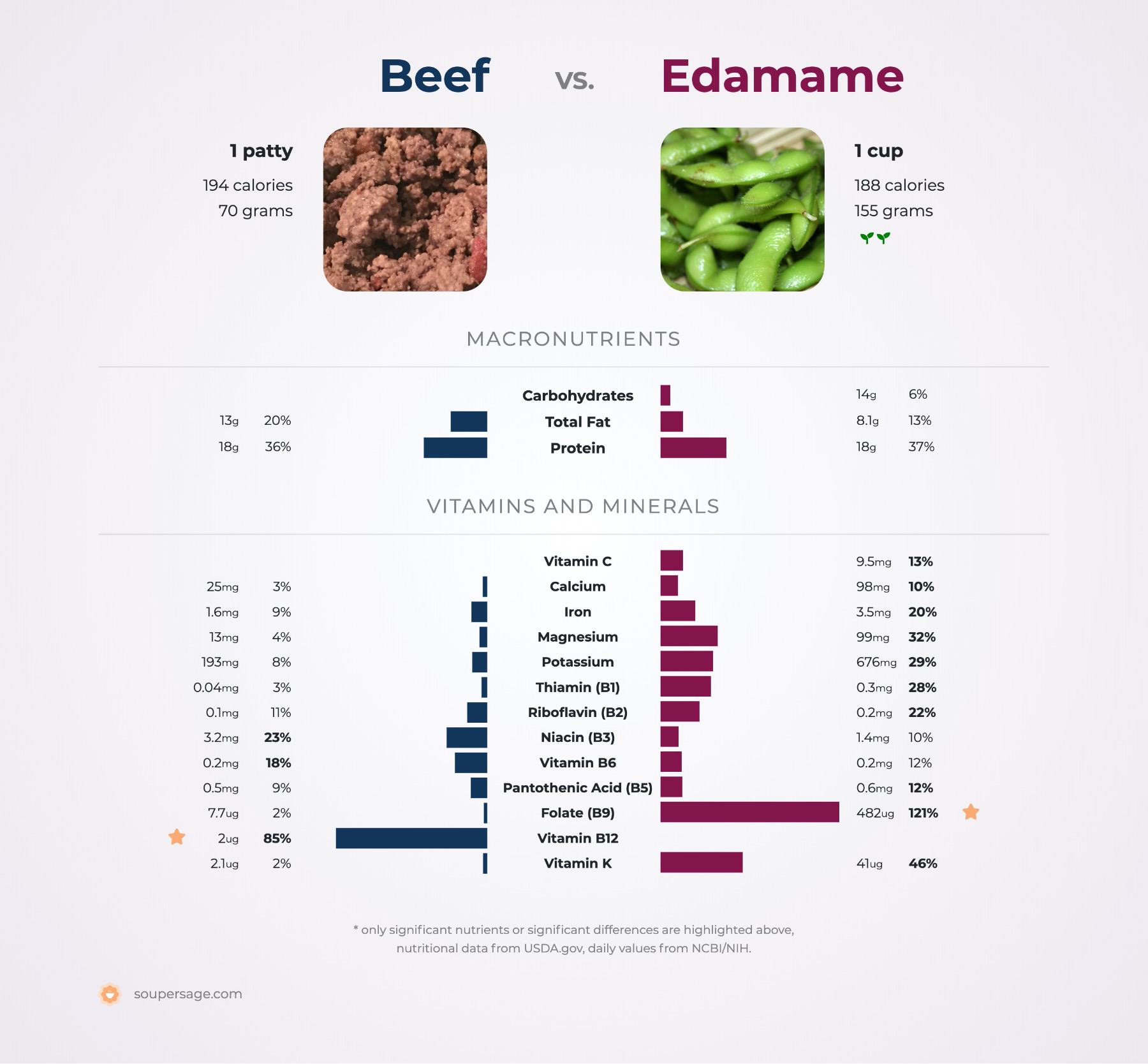Beef vs. Edamame
Nutrition comparison of Cooked Beef and Edamame
Ever wonder how your favorite foods stack up against each other in terms of nutrition?
We compared the nutritional contents of
cooked
beef
versus
edamame
(100g each)
below using 2020 USDA and NIH data[1].
For a quick recap of significant nutrients and differences in beef and edamame:
- Both edamame and beef are high in calories, iron, potassium and protein.
- Edamame has 128.7 times less trans fat than beef.
- Edamame has more thiamin and folate, however, beef contains more niacin, Vitamin B6 and Vitamin B12.
- Edamame is an excellent source of calcium and dietary fiber.
USDA sources for nutritional information: Beef (Beef, ground, 70% lean meat / 30% fat, patty, cooked, broiled) and Edamame (Edamame, frozen, prepared) . Have a correction or suggestions? Shoot us an email.
Calories and Carbs
calories
Both edamame and beef are high in calories. Beef has 129% more calories than edamame - edamame has 121 calories per 100 grams and beef has 277 calories.
For macronutrient ratios, beef is much lighter in carbs, much heavier in fat and similar to edamame for protein. Beef has a macronutrient ratio of 38:0:62 and for edamame, 37:27:36 for protein, carbohydrates and fat from calories.
Macro Ratios from Calories:
| Beef | Edamame | |
|---|---|---|
| Protein | 38% | 37% |
| Carbohydrates | ~ | 27% |
| Fat | 62% | 36% |
| Alcohol | ~ | ~ |
carbohydrates
Beef has less carbohydrates than edamame - edamame has 8.9g of total carbs per 100 grams and beef does not contain significant amounts.
dietary fiber
Edamame is an excellent source of dietary fiber and it has more dietary fiber than beef - edamame has 5.2g of dietary fiber per 100 grams and beef does not contain significant amounts.
sugar
Beef has less sugar than edamame - edamame has 2.2g of sugar per 100 grams and beef does not contain significant amounts.
Protein
protein
Both edamame and beef are high in protein. Beef has 113% more protein than edamame - edamame has 11.9g of protein per 100 grams and beef has 25.4g of protein.
Fat
saturated fat
Beef is high in saturated fat and edamame has 92% less saturated fat than beef - edamame has 0.62g of saturated fat per 100 grams and beef has 7.3g of saturated fat.
trans fat
Edamame has 128.7 times less trans fat than beef - edamame has 0.01g of trans fat per 100 grams and beef has 1.2g of trans fat.
cholesterol
Edamame has less cholesterol than beef - beef has 88mg of cholesterol per 100 grams and edamame does not contain significant amounts.
Vitamins
Vitamin C
Edamame has more Vitamin C than beef - edamame has 6.1mg of Vitamin C per 100 grams and beef does not contain significant amounts.
Vitamin A
Edamame and beef contain similar amounts of Vitamin A - edamame has 15ug of Vitamin A per 100 grams and beef has 3ug of Vitamin A.
Vitamin D
Beef and edamame contain similar amounts of Vitamin D - beef has 2iu of Vitamin D per 100 grams and edamame does not contain significant amounts.
Vitamin E
Edamame and beef contain similar amounts of Vitamin E - edamame has 0.68mg of Vitamin E per 100 grams and beef has 0.12mg of Vitamin E.
Vitamin K
Edamame has 790% more Vitamin K than beef - edamame has 26.7ug of Vitamin K per 100 grams and beef has 3ug of Vitamin K.
The B Vitamins
Edamame has more thiamin and folate, however, beef contains more niacin, Vitamin B6 and Vitamin B12. Both beef and edamame contain significant amounts of riboflavin and pantothenic acid.
| Beef | Edamame | |
|---|---|---|
| Thiamin | 0.051 MG | 0.2 MG |
| Riboflavin | 0.176 MG | 0.155 MG |
| Niacin | 4.537 MG | 0.915 MG |
| Pantothenic acid | 0.658 MG | 0.395 MG |
| Vitamin B6 | 0.336 MG | 0.1 MG |
| Folate | 11 UG | 311 UG |
| Vitamin B12 | 2.9 UG | ~ |
Minerals
calcium
Edamame is an excellent source of calcium and it has 80% more calcium than beef - edamame has 63mg of calcium per 100 grams and beef has 35mg of calcium.
iron
Both edamame and beef are high in iron. Edamame is very similar to beef for iron - edamame has 2.3mg of iron per 100 grams and beef has 2.3mg of iron.
potassium
Both edamame and beef are high in potassium. Edamame has 59% more potassium than beef - edamame has 436mg of potassium per 100 grams and beef has 275mg of potassium.
Omega-3 and Omega-6
omega 3s
For omega-3 fatty acids, edamame has more alpha linoleic acid (ALA) than beef per 100 grams.
| Beef | Edamame | |
|---|---|---|
| alpha linoleic acid | 0.056 G | 0.358 G |
| EPA | ~ | 0.003 G |
| Total | 0.056 G | 0.361 G |
omega 6s
Comparing omega-6 fatty acids, edamame has more linoleic acid than beef per 100 grams.
| Beef | Edamame | |
|---|---|---|
| other omega 6 | ~ | 0.002 G |
| linoleic acid | 0.39 G | 1.792 G |
| Total | 0.39 G | 1.794 G |
Customize your serving size
The comparison below is by common portions, e.g. cups, packages. You can also see a more concrete comparison by weight at equal weight (by grams) comparison.
Cooked Beef g
()
|
Daily Values (%) |
Edamame g
()
|
|||||
|---|---|---|---|---|---|---|---|
| KCAL % |
|
5% | calories | 5% |
|
KCAL % | |
| G % |
|
5% | carbohydrates | 5% |
|
G % | |
| G % |
|
5% | dietary fiber | 5% |
|
G % | |
| G | 5% | sugar | 5% | G | |||
| G % |
|
5% | total fat | 5% |
|
G % | |
| G % |
|
5% | saturated fat | 5% |
|
G % | |
| G | 5% | monounsaturated fat | 5% | G | |||
| G | 5% | polyunsaturated fat | 5% | G | |||
| G | 5% | trans fat | 5% | G | |||
| MG | 5% | cholesterol | 5% | MG | |||
| MG % |
|
5% | sodium | 5% |
|
MG % | |
| 5% | Vitamins and Minerals | 5% | |||||
| UG % |
|
5% | Vitamin A | 5% |
|
UG % | |
| MG % |
|
5% | Vitamin C | 5% |
|
MG % | |
| IU % |
|
5% | Vitamin D | 5% |
|
IU % | |
| MG % |
|
5% | calcium | 5% |
|
MG % | |
| MG % |
|
5% | iron | 5% |
|
MG % | |
| MG % |
|
5% | magnesium | 5% |
|
MG % | |
| MG % |
|
5% | potassium | 5% |
|
MG % | |
| MG % |
|
5% | thiamin (Vit B1) | 5% |
|
MG % | |
| MG % |
|
5% | riboflavin (Vit B2) | 5% |
|
MG % | |
| MG % |
|
5% | niacin (Vit B3) | 5% |
|
MG % | |
| MG % |
|
5% | Vitamin B6 | 5% |
|
MG % | |
| MG % |
|
5% | pantothenic acid (Vit B5) | 5% |
|
MG % | |
| UG % |
|
5% | folate (Vit B9) | 5% |
|
UG % | |
| UG % |
|
5% | Vitamin B12 | 5% |
|
UG % | |
| MG % |
|
5% | Vitamin E | 5% |
|
MG % | |
| UG % |
|
5% | Vitamin K | 5% |
|
UG % | |
| G % |
|
5% | protein | 5% |
|
G % | |
| UG % |
|
5% | biotin (Vit B7) | 5% |
|
UG % | |
| MG % |
|
5% | choline | 5% |
|
MG % | |
| MG % |
|
5% | chlorine | 5% |
|
MG % | |
| UG % |
|
5% | chromium | 5% |
|
UG % | |
| MG % |
|
5% | copper | 5% |
|
MG % | |
| UG % |
|
5% | fluoride | 5% |
|
UG % | |
| UG % |
|
5% | iodine | 5% |
|
UG % | |
| MG % |
|
5% | manganese | 5% |
|
MG % | |
| UG % |
|
5% | molybdenum | 5% |
|
UG % | |
| MG % |
|
5% | phosphorus | 5% |
|
MG % | |
| UG % |
|
5% | selenium | 5% |
|
UG % | |
| MG % |
|
5% | zinc | 5% |
|
MG % | |
| G | 5% | Water | 5% | G | |||
| G | 5% | Starch | 5% | G | |||
| G | 5% | Alcohol | 5% | G | |||
FAQ
Does edamame or beef contain more calories in 100 grams?Both edamame and beef are high in calories. Beef has 130% more calories than edamame - edamame has 121 calories in 100g and beef has 277 calories.
Is edamame or beef better for protein?
Both edamame and beef are high in protein. Beef has 110% more protein than edamame - edamame has 11.9g of protein per 100 grams and beef has 25.4g of protein.
Does edamame or beef contain more calcium?
Edamame is a rich source of calcium and it has 80% more calcium than beef - edamame has 63mg of calcium in 100 grams and beef has 35mg of calcium.
Does edamame or beef contain more iron?
Both edamame and beef are high in iron. Edamame is very similar to beef for iron - edamame has 2.3mg of iron in 100 grams and beef has 2.3mg of iron.
Does edamame or beef contain more potassium?
Both edamame and beef are high in potassium. Edamame has 60% more potassium than beef - edamame has 436mg of potassium in 100 grams and beef has 275mg of potassium.


